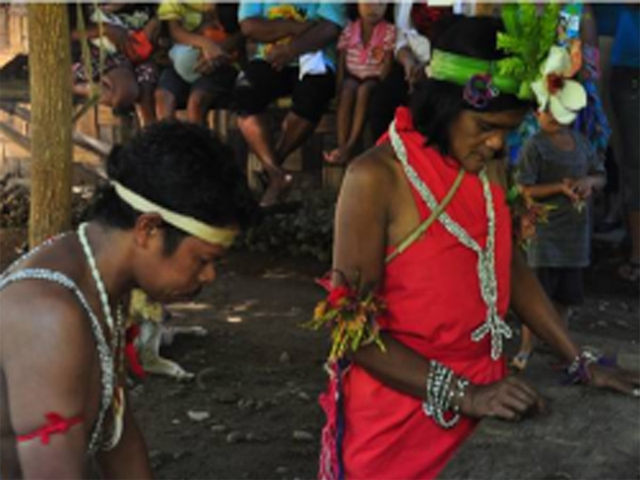ADVERTISEMENT
Filtered By: Lifestyle
Lifestyle
Dumagat woman welcomes 'new things' for love of family
“Kwatang,” as 44-year-old Emily Sarmiento is called by around her tribe in Rodriguez, Rizal, is a Dumagat at heart despite recent “flexibility” in her belief system.
Her respect for her tribe’s age-old tradition is still generally intact, but she has learned to be open to new ideas and ways, especially if these will benefit her children.
This new attitude came about when Kwatang went through a painful and traumatic experience.

Kwatang performs a Dumagat ritual in Rodriguez, Rizal. Fernando dela Cruz
She was able to safely reach her home, where she delivered the baby by herself. It was a difficult labor. Then tragedy struck—the baby was already lifeless when it came out of Kwatang’s womb.
Kwatang was beside herself. Guilt devoured her being. After this excruciating process, she pledged to be more open to new things that are, after all, beneficial to her and her family.
“I rejected many things thinking that such betray my tribe’s culture. I was wrong,” she admits.
Kwatang is now “enlightened,” she says, thanks to the lessons she learned during the Family Development sessions of the Pantawid Pamilyang Pilipino Program (4Ps) of the Department of Social Welfare and Development (DSWD).
“These sessions taught me the essence of being a responsible parent,” she says.
The regular gathering of parent-beneficiaries of 4Ps, Kwatang relates, tackle topics such as effective parenting, husband and wife relationships, child development, laws affecting the Filipino family, gender and development and home management.
Slowly, Kwatang’s worldview shifted as she accumulates knowledge about her role and responsibilities as a mother. She now pays more attention to her children’s health and well-being.
Her family is one of the 370,766 indigenous people enrolled in 4Ps nationwide. As of last June 26, the program boasts of 3.9 million household-beneficiaries.
According to government records, this conditional cash transfer scheme is meant to break the inter-generational cycle of poverty of poor households by investing in human capital particularly on health, nutrition, and education of children aged 0-14.
Beneficiaries are given cash grants of as much as P1,400 pesos for the education and health needs of three qualified children.
The Dumagat, on of the tribes in Luzon, has a traditional practice to marry off young girls at age 14. Kwatang herself married at that exact age while she was still in Grade 2. She had little choice since her parents forced her to marry.
This is why education, particularly for girls, was not that high in the tribe’s priority list. But not to Kwatang, who now puts a premium on education of her children.
There was a time when her children only attended an informal school within their “sitio.” The nearest elementary school is three hours’ walk away.
To remedy this situation, her family moved to her brother’s house that is just a 30-minute walk away from school. Currently, three of Kwatang’s children are attending school.
This mother is determined to support her children’s education ‘as far as their abilities will take them.”
“I do not want my children to grow up unschooled like us. I want them to finish school and make something of themselves,” Kwatang says. — Fernando dela Cruz /LBG, GMA News
More Videos
Most Popular




